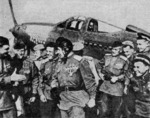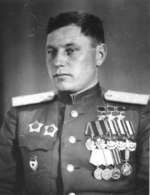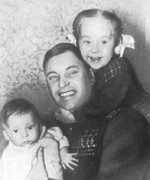Aleksandr Pokryshkin
| Surname | Pokryshkin |
| Given Name | Aleksandr |
| Born | 6 Mar 1913 |
| Died | 13 Nov 1985 |
| Country | Russia |
| Category | Military-Air |
| Gender | Male |
Contributor: C. Peter Chen
ww2dbaseAleksandr Ivanovich Pokryshkin was born in Novosibirsk, Russia to a poor peasant father who later became a factory worker. Unlike most of his peers in the poor neighborhood, he strove to learn, earning him the nickname "Engineer" as a teenager. At 12 years of age, he attended an air show, and became interested in aviation. In 1928, he dropped out of school to become a construction worker, but in 1930 he enrolled himself into a local technical college. In 1931, he found work at a munitions factory as a steel worker. Later that year, he joined the Russian Army and enrolled in the flight school. In 1932, the flight school closed, and he completed his training in 1933 as an aircraft mechanic instead of a pilot. In Dec 1934, he became the Senior Aviation Mechanic of the 74th Infantry Division. In Nov 1938, he passed a civilian pilot program, and with that certification he was able to return to a military flight school, which program he completed in 1939 with top honors. He was assigned to the 55th Fighter Regiment at the rank of senior lieutenant.
ww2dbaseIt was unclear whether Pokryshkin participated in Russia's first campaign in WW2, which was the joint-invasion of Poland with Germany. When Germany invaded the Soviet Union in Jun 1941, however, he was caught in the thick of it. While stationed in Moldovan Soviet Socialist Republic, his airfield was bombed by German aircraft on the first day of the invasion. In response, he scrambled in his MiG-3 fighter to challenge any aircraft in the air, only to mistakenly shoot down a Russian Su-2 light bomber. On the next day, however, he was able to claim his first real victory, a Bf-109 fighter. On 3 Jul, he was shot down by German flak behind German lines, but was able to return to his unit after four days. In 1941, in treacherous weather conditions and flying with little fuel, he located a German armor unit that the ground forces had lost contact with, and won the Order of Lenin. In the summer of 1942, his regiment was recalled to the rear, was given a new commanding officer, and was re-equipped with the American-manufactured P-39 Airacobra fighters. Pokryshkin and the new commanding officer did not get along, largely due to Pokryshkin's constant lecture of how Russian fighter tactics should change. The commanding officer grounded Pokryshkin and revoked his communist party membership, but these decisions were reversed shortly after by a higher ranking officer.
ww2dbasePokryshkin took a great liking to the P-39 Airacobra fighter he was assigned, particularly in regards to the ample fire power. He modified his aircraft so that a single button could simultaneously fire all forward weapons mounted on it, thus tremendously adding the destructive power of each salvo. Several times during the war, directives from Moscow requested his units to consider switching to flying Russian-built aircraft such as the La-5 or Yak fighters, but he turned down the request each time. There existed a rumor that in 1944, his unit secretly switched to flying the P-63 Kingcobra fighters, another design from the United States exported to Russia via Lend-Lease that was not supposed to be used in Europe (instead, they were to be readied in the far east for use after the eventual declaration of war of Russia on Japan), though none of the Russian state records support such a claim.
ww2dbaseIn 1943, Pokryshkin was assigned to the Kuban region in southern Russia on the eastern shores of the Black Sea. Against German Luftwaffe units based on the Crimean Peninsula, he invented new fighter tactics, such as stacking different types of fighters suitable at various altitudes to counter German aerial advances. Having access to 4th Air Army's mobile ground-based radar, he became a proponent of this new technology and effectively used radar intelligence to intercept German and Romanian aircraft on more than one occasion. On 29 Apr 1943, eight P-39 Airacobra fighters, one of which he piloted, attacked three squadrons of Ju-87 Stuka dive bombers escorted by Bf-109 fighters, downing 12 German aircraft; Pokryshkin claimed 5 kills. On 21 Sep, he shot down two or three Ju-88 aircraft in a single pass, which took place at low altitude, thus witnessed by many Russian troops and journalists and promoting his fame. In Feb 1944, Pokryshkin was offered a staff position managing pilot training, which he promptly turned down. Nevertheless, by this time, he had already become one of the focal points of Soviet propaganda campaigns, so he was not allowed to fly as often in order to prevent death or capture. In Jun 1944, he was promoted to the rank of colonel and was given command of the 9th Guards Air Division. On 19 Aug, he was awarded the Gold Star of the Hero of the Soviet Union; it was his third time being named a Hero of the Soviet Union.
ww2dbaseWhen the war ended, Pokryshkin recorded 65 confirmed kills (6 jointly with other pilots), with the majority scored between 1941 and 1943; this statistic might be incorrect, however, as Russian authority only recognized kills which wreckages could be found, and also because Russian pilots regularly gave credit to fellow pilots as each kill meant a monetary compensation that the pilots might wish to share with friends. Pokryshkin had noted on several occasions that his actual total kills during the war was probably in the vicinity of 100. Despite being a famed pilot, his preference for American aircraft, particularly the P-39 Airacobra, stunted his career growth. After Joseph Stalin died, however, he finally removed a political enemy resumed his career track. He was promoted to the rank of air general and assumed several regional command roles. During his career, he received three Hero of the Soviet Union Gold Stars, four Orders of Lenin, Order of the October Revolution, four Orders of the Red Banner, two Orders of Suvorov (2nd class), two Orders of the Red Star, and a number of other medals Russian and foreign, including the United States Army Air Forces Distinguished Service Medal.
ww2dbaseIn 1978, a minor planet was found by Soviet astronomer Nikolai Stepanovich Chernykh and was named after him (3348 Pokryshkin).
ww2dbaseSource: Wikipedia.
Last Major Revision: Jul 2008
Photographs
 |  |  |
Aleksandr Pokryshkin Timeline
| 6 Mar 1913 | Aleksandr Pokryshkin was born. |
| 13 Nov 1985 | Aleksandr Pokryshkin passed away. |
Did you enjoy this article or find this article helpful? If so, please consider supporting us on Patreon. Even $1 per month will go a long way! Thank you. Share this article with your friends: Stay updated with WW2DB: |
Visitor Submitted Comments
All visitor submitted comments are opinions of those making the submissions and do not reflect views of WW2DB.
» P-39 Airacobra
- » 1,150 biographies
- » 337 events
- » 43,917 timeline entries
- » 1,241 ships
- » 350 aircraft models
- » 207 vehicle models
- » 375 weapon models
- » 123 historical documents
- » 260 facilities
- » 470 book reviews
- » 28,559 photos
- » 432 maps
James Forrestal, Secretary of the Navy, 23 Feb 1945
Please consider supporting us on Patreon. Even $1 a month will go a long way. Thank you!
Or, please support us by purchasing some WW2DB merchandise at TeeSpring, Thank you!
4 Jan 2011 10:56:46 AM
FROM MY LATE UNCLE TICHONCHUK'S PAPERS, THIS GUY WAS A RELATIVE OF MINE.........